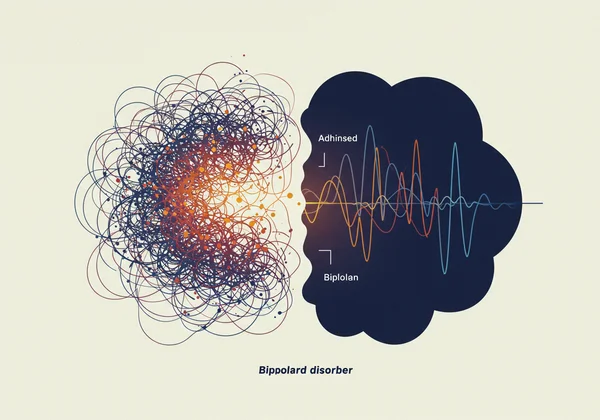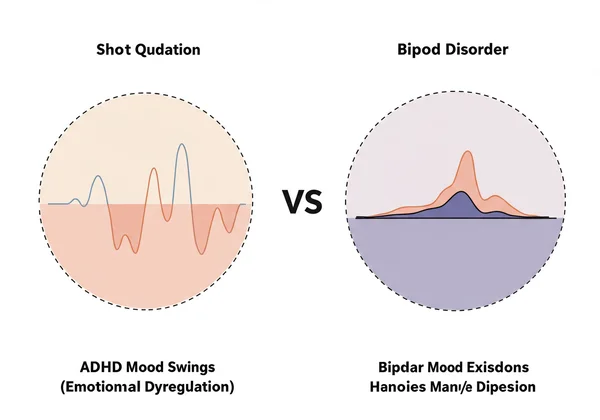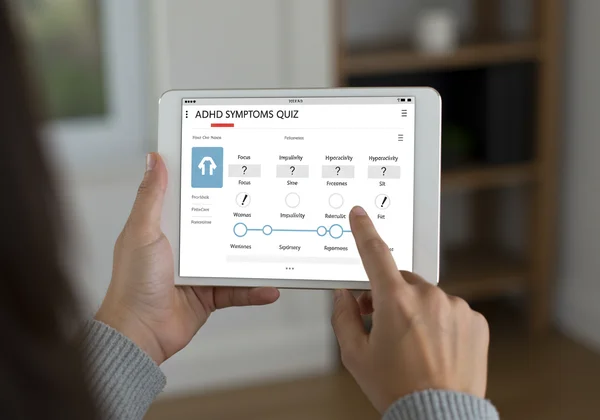ADHD vs. Bipolar Quiz: Symptoms & Clarity Before Your Test
October 11, 2025 | By Julian Navarro
Are you feeling lost in a whirlwind of emotional highs and lows, struggling with focus, and acting on impulse? It's a confusing and often distressing experience. Many people find themselves wondering if their symptoms point to ADHD or Bipolar Disorder, as the signs can feel incredibly similar. If you've ever asked yourself, do i have adhd quiz?, you understand the search for answers. This guide is here to help you untangle the confusion, clarify the key differences, and prepare you for a more informed conversation with a professional, starting with a reliable adhd quiz.
The journey to self-understanding can be complex, but gaining initial clarity is a powerful first step. By exploring the nuances between these conditions, you can better articulate your experiences and move forward with confidence. Let's begin to gain some clarity on what you might be feeling.
Understanding ADHD vs. Bipolar: Overlapping & Distinct Symptoms
At first glance, the impulsivity, distractibility, and emotional intensity seen in both ADHD and Bipolar Disorder can look nearly identical. Both can impact your relationships, career, and overall sense of stability. However, the underlying reasons and patterns for these symptoms are fundamentally different. Understanding these distinctions is the first step in a proper adhd or bipolar quiz of your own experiences.

When Mood Swings are More Than Just ADHD Reactivity
One of the most significant points of confusion is mood. People with ADHD often experience intense, short-lived emotional shifts, a concept known as emotional dysregulation. A minor frustration can lead to a burst of anger, or a happy moment can feel euphoric, but these feelings are typically tied to a specific trigger and fade relatively quickly.
In contrast, the mood shifts in Bipolar Disorder are characterized by distinct, prolonged episodes that represent a significant change from a person's usual self. A manic or hypomanic episode involves elevated energy, euphoria, and irritability lasting for several days or longer, while a depressive episode involves deep sadness and loss of interest for at least two weeks. These episodes are often cyclical and not necessarily linked to an immediate external event.

Impulsivity and Distractibility: Similarities and Nuances
Both conditions involve challenges with impulsivity and focus, but the context matters. For an individual with ADHD, impulsivity often stems from struggles with executive function—the brain's management system. This might look like interrupting others, making hasty decisions without thinking through the consequences, or struggling to resist immediate temptations. Distractibility is a constant companion, where the brain is easily pulled away by external stimuli or internal thoughts.
In Bipolar Disorder, severe impulsivity and distractibility are hallmark symptoms of manic or hypomanic episodes. During these periods, a person might engage in high-risk behaviors like reckless spending, substance abuse, or impulsive relationship decisions. This is driven by the elevated mood and racing thoughts of the episode, rather than the chronic baseline struggle seen in ADHD.
Beyond the Obvious: Core Diagnostic Criteria for Each Condition
To truly differentiate the two, mental health professionals look at the long-term pattern of symptoms. ADHD is a neurodevelopmental condition, meaning its core symptoms of inattention and/or hyperactivity-impulsivity are present from childhood and persist consistently throughout a person's life.
Bipolar Disorder is primarily a mood disorder characterized by these distinct manic episodes and depressive episodes. While symptoms can emerge in adolescence, the condition is defined by the cyclical nature of these mood states, with periods of relative stability in between. A person's baseline functioning when not in an episode can be very different from their functioning during one.
Why Differential Diagnosis Matters: The Importance of Professional Insight
Telling these conditions apart is not just an academic exercise; it's critical for effective treatment and support. The strategies and medications used to manage ADHD can be ineffective or even worsen the symptoms of Bipolar Disorder, and vice versa. This is why a professional evaluation is non-negotiable.

Misdiagnosis Risks: Why Self-Assessment Isn't Enough
While exploring your symptoms online is a valid starting point, relying solely on self-assessment carries significant risks. A differential diagnosis—the process of distinguishing between two or more conditions with similar symptoms—requires a trained professional who can look at your complete history, symptom patterns, and family background.
An incorrect self-diagnosis can lead to pursuing the wrong coping strategies, feeling frustrated when they don’t work, and delaying access to the right kind of help. Using an online tool should be seen as gathering information for a doctor, not as reaching a final conclusion. Taking a quiz is a reliable first step, not the final destination.
Preparing for Your Consultation: What to Tell Your Doctor
To make the most of your appointment, preparation is key. A professional assessment will be far more accurate if you can provide clear, detailed information. Before you go, consider tracking your symptoms.
- Mood: How long do your moods last? Are they triggered by events, or do they seem to come out of nowhere?
- Energy Levels: Do you have distinct periods of unusually high energy and reduced need for sleep?
- Impulsivity: What kind of impulsive decisions do you make? Are they constant, or do they happen in clusters?
- History: When did you first notice these challenges? Were there signs in your childhood?
Bringing these notes can help your doctor see the full picture and guide them toward an accurate diagnosis.
Using an ADHD Quiz to Gain Initial Clarity: Your First Step
So, where does an online tool fit into this complex picture? While it can't distinguish between ADHD and Bipolar Disorder, a well-designed quiz can serve as a powerful screening instrument. It helps you focus your self-reflection and identify if your symptoms align with the core characteristics of ADHD.
How Our Free Online ADHD Quiz Can Help Filter Your Symptoms
The goal of an ADHD symptoms quiz is to measure the frequency and severity of behaviors associated with inattention, hyperactivity, and impulsivity. By answering a series of targeted questions based on established criteria like the DSM-5, you can get a clearer picture of whether your experiences are consistent with the ADHD profile.
This process acts as a filter. If your results from our free online quiz indicate a high likelihood of ADHD traits, it provides a solid, specific starting point for a conversation with a healthcare provider. It helps you move from "I feel all over the place" to "I'm noticing significant challenges with focus and organization that are impacting my life."

What an Online ADHD Quiz Can and Cannot Tell You
It is essential to have realistic expectations. An online quiz can offer preliminary insights, validate your feelings, and empower you to seek professional help. It can help you organize your thoughts and provide a language to describe your struggles.
However, an online quiz cannot diagnose you with ADHD, nor can it rule out Bipolar Disorder or any other condition. It is a screening tool, not a diagnostic instrument. Think of it as taking your temperature when you feel sick—it tells you there's a problem, but it doesn't tell you whether you have a cold, the flu, or something else entirely.
Finding Your Path to Understanding and Support
Understanding your unique experiences, whether they align with ADHD, Bipolar Disorder, or both, is a powerful step towards building a better life. This journey requires self-reflection and, crucially, a partnership with a healthcare professional. You don't need to tackle this uncertainty alone. Taking an initial step, like using a reliable ADHD screening tool, can give you the clarity and focus needed to start meaningful conversations about your mental health.
Ready to take that first step? Take our free ADHD quiz today and use your results as a valuable starting point for a meaningful conversation with a doctor who can help you find your path.
Your Questions About ADHD & Bipolar Symptoms Answered
How do I know if my mood swings are ADHD or Bipolar?
The key difference is the pattern. ADHD mood swings are typically brief, reactive emotional responses to specific situations (emotional dysregulation). Bipolar mood swings are prolonged episodes of depression or mania/hypomania that last for days or weeks and represent a distinct change from your usual self.
Can an online quiz tell me if I have ADHD or Bipolar Disorder?
No. An online quiz cannot provide a medical diagnosis for either condition. A tool like an ADHD self-assessment quiz is designed specifically to screen for ADHD traits. It can help you determine if your symptoms align with that condition, but it cannot diagnose you or rule out other possibilities like Bipolar Disorder.
What are the first steps if I suspect both ADHD and Bipolar?
The most crucial first step is to consult a mental health professional, such as a psychiatrist or psychologist. Before your appointment, track your symptoms, noting their duration, intensity, and triggers. An ADHD self-assessment can help organize your observations related to attention and impulsivity to share with your doctor.
Is it possible to have both ADHD and Bipolar Disorder?
Yes, it is possible to have both conditions, which is known as comorbidity. This makes a professional diagnosis even more critical, as a treatment plan must be carefully designed to address the symptoms of both disorders effectively. Only a comprehensive evaluation can determine if you have one, the other, or both.